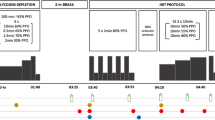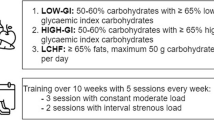Abstract
The aim of the present study was to clarify the effect of carbohydrate (CHO) supplementation on moderate and high-intensity endurance exercise in the heat. Eight endurance-trained men [maximal oxygen uptake (VO2max) 59.5±1.6 ml kg−1 bw−1, mean±SE] cycled to exhaustion twice at 60% VO2max and twice at 73% VO2max at an ambient temperature of 35°C. Subjects ingested either a 6.4% maltodextrin solution (CHO) or an artificially flavoured and coloured placebo (PLA). Time to fatigue was significantly greater with CHO in both the 60% and 73% VO2max trials (14.5% and 13.5% improvement, respectively). Heart rate and oxygen uptake (VO2) did not differ at any point between PLA and CHO. Hypoglycaemia was not seen in any condition but plasma glucose concentrations tended to be higher at both intensities when CHO was fed. CHO oxidation rates were similar at 60% VO2max between CHO and PLA. There were no differences between PLA and CHO in the rate of rise of rectal temperatures (T rec) at either intensity but there was a trend for subjects to fatigue at a high temperature when taking CHO. Ratings of perceived exertion (RPE) tended to be lower throughout both CHO trials; this was significant at 80 min and at fatigue at 60% VO2max. It is concluded that supplementation with CHO improves exercise performance in the heat at both moderate and high endurance intensities. In the absence of a clear metabolic explanation, a central effect involving an increased tolerance of rising deep body temperature merits further investigation.





Similar content being viewed by others
References
Anantaraman R, Carmines AA, Gaesser GA, Weltman A (1995) Effects of carbohydrate supplementation on performance during 1 hour of high intensity exercise. Int J Sports Med 16:461–465
Ball TC, Headley SA, Vanderburgh PM, Smith JC (1995) Periodic carbohydrate replacement during 50 min of high-intensity cycling improves subsequent sprint performance. Int J Sport Nutr 5:151–158
Below PR, Mora-Rodriguez R, Gonzalez-Alonso J, Coyle E (1995) Fluid and carbohydrate ingestion independently improve performance during 1 h of intense exercise. Med Sci Sports Exerc 27:200–210
Borg GAV (1982) Psychophysical bases of perceived exertion. Med Sci Sports Exerc 14:377–381
Brisson GR, Peronnet F, Perrault H, Boisvert P, Massicotte D, Gareau R (1991) Prolactinotrophic effect of endogenous and exogenous heat loads in human male adults. J Appl Physiol 70:1351–1355
Bruck K, Olschewski H (1987) Body temperature related factors diminishing the drive to exercise. Can J Physiol Pharmacol 65:1274–1280
Coggan AR, Coyle EF (1987) Reversal of fatigue during prolonged exercise by carbohydrate infusion or ingestion. J Appl Physiol 63:2388–2395
Coggan AR, Coyle EF (1988) Effect of carbohydrate feedings during high-intensity exercise. J Appl Physiol 65:1703–1709
Costill DL, Saltin B (1974) Factors limiting gastric emptying during rest and exercise. J Appl Physiol 37:679–683
Coyle EF, Hagberg JM, Hurley BF, Martin WH, Ehsani AA, Holloszy JO (1983) Carbohydrate feeding during prolonged strenuous exercise can delay fatigue. J Appl Physiol 55:230–235
Coyle EF, Coggan AR, Hemmert MK, Ivy JL (1986) Muscle glycogen utilisation during prolonged strenuous exercise when fed carbohydrate. J Appl Physiol 61:165–172
Davis JM, Burgess WA, Slentz CA, Bartoli WP, Pate RR (1988) Effects of ingesting 6% and 12% glucose/electrolyte beverages during prolonged intermittent cycling in the heat. Eur J Appl Physiol 57:563–569
Davis JM, Lamb DR, Pate RR, Slentz CA, Burgess WA, Bartoli WP (1988) Carbohydrate-electrolyte drinks: effects on endurance cycling in the heat. Am J Clin Nutr 48:1023–1030
Dill DB, Costill DL (1974) Calculation of percentage changes in volumes of blood, plasma, and red cells in dehydration. J Appl Physiol 37:247–248
El-Sayed MS, Balmer J, Rattu AJM (1997) Carbohydrate ingestion improves endurance performance during a 1-h simulated cycling time trial. J Sports Sci 15:223–230
Febbraio MA (1999) Temperature, muscle metabolism and performance. In: Lamb DR, Murray R (eds) Perspectives in exercise science and sports medicine: the metabolic basis of performance in exercise and sport. Cooper, Carmel, pp 315–353
Febbraio MA, Murton P, Selig SE, Clark SA, Lambert DL, Angus DJ, Carey MF (1996) Effect of CHO ingestion on exercise metabolism and performance in different ambient temperatures. Med Sci Sports Exerc 28:1380–1387
Frank SM, Raja SR, Bulcao CF, Goldstein DS (1999) Relative contribution of core and cutaneous temperatures to thermal comfort and autonomic responses in humans. J Appl Physiol 86:1588–1593
Frayn KN (1983) Calculation of substrate oxidation rates in vivo from gaseous exchange. J Appl Physiol 55:628–634
Galloway SD, Maughan RJ (2000) The effects of substrate and fluid provision on thermoregulatory provision on thermoregulatory and metabolic responses to prolonged exercise in a hot environment. J Sports Sci 18:339–351
Gonzalez-Alonso J, Calbet JAL, Nielsen B (1998) Muscle blood flow is reduced with dehydration during prolonged exercise in humans. J Physiol (Lond) 513:895–905
Gonzalez-Alonso J, Teller C, Andersen SL, Jensen FB, Hyldig T, Nielsen B (1999) Influence of body temperature on the development of fatigue during prolonged exercise in the heat. J Appl Physiol 86:1032–1039
Jeukendrup A, Brouns F, Wagenmakers AJM, Saris WHM (1997) Carbohydrate-electrolyte feedings improve 1-h time trial cycling performance. Int J Sports Med 18:125–129
Kuipers H, Verstappen FTJ, Keizer HA, Geurten P, Van Kranenburg G (1985) Variability of aerobic performance in the laboratory and its physiologic correlates. Int J Sports Med 6:197–201
Millard-Stafford M, Starling PB, Rosskopf LB, Hinson BT, Dicarlo LJ (1990) Carbohydrate-electrolyte replacement during a simulated triathlon in the heat. Med Sci Sports Exerc 22:621–628
Millard-Stafford ML, Starling PB, Rosskopf LB, Dicarlo LJ (1992) Carbohydrate-electrolyte replacement improves distance running performance in the heat. Med Sci Sports Exerc 24:934–940
Millard-Stafford M, Rosskopf LB, Snow TK, Hinson BT (1997) Water versus carbohydrate-electrolyte ingestion before and during a 15-km run in the heat. Int J Sport Nutr 7:26–38
Mitchell JW, Nadel ER, Stolwijk JAJ (1972) Respiratory weight losses during exercise. J Appl Physiol 32:474–476
Murray R, Eddy DE, Murray TW, Seifert JG, Paul GL, Halaby GA (1987) The effect of fluid and carbohydrate feedings during intermittent cycling exercise. Med Sci Sports Exerc 19:597–604
Neuffer PD, Costill DL, Flynn MG, Kirwan JP, Mitchell JB, Houmard J (1987) Improvements in exercise performance: effects of carbohydrate feedings and diet. J Appl Physiol 62:983–988
Nielsen B, Savard G, Richter EA, Hargreaves M, Saltin B (1990) Muscle blood flow and muscle metabolism during exercise and heat stress. J Appl Physiol 69:1040–1046
Nielsen B, Hales JRS, Strange S, Juel Christensen N, Warberg J, Saltin B (1993) Human circulatory and thermoregulatory adaptations with heat acclimation and exercise in a hot, dry environment. J Physiol (Lond) 460:467–485
Nielsen R, Nielsen B (1984) Measurement of mean skin temperature of clothed persons in cool environments. Eur J Appl Physiol 53:231–236
Nybo L, Nielsen B (2001) Perceived exertion is associated with an altered brain activity during exercise with progressive hyperthermia. J Appl Physiol 91:2017–2023
Parkin JM, Carey MF, Zhao S, Febbraio MA (1999) Effect of ambient temperature on human skeletal muscle metabolism during fatiguing submaximal exercise. J Appl Physiol 86:902–908
Pitsiladis YP, Maughan RJ (1999) The effects of exercise and diet manipulation on the capacity to perform prolonged exercise in the heat and in the cold in trained humans. J Physiol (Lond) 517:919–930
Pitts GC, Johnson RE, Consolazio FC (1944) Work in the heat as affected by intake of water, salt and glucose. Am J Physiol 142:253–259
Snellen JW (1966) Mean body temperature and the control of thermal sweating. Acta Physiol Pharmacol Neerl 14:99–174
Vist GE, Maughan RJ (1995) The effect of osmolality and carbohydrate content on the rate of gastric emptying of liquids in man. J Physiol (Lond) 486:523–531
Wagenmakers AJM, Brouns F, Saris WHM, Halliday D (1993) Oxidation rates of orally ingested carbohydrates during prolonged exercise in men. J Appl Physiol 75:2774–2780
Walsh RM, Noakes TD, Hawley JA, Dennis SC (1994) Impaired high-intensity cycling performance time at low levels of dehydration. Int J Sports Med 15:392–398
Author information
Authors and Affiliations
Corresponding author
Rights and permissions
About this article
Cite this article
Carter, J., Jeukendrup, A.E., Mundel, T. et al. Carbohydrate supplementation improves moderate and high-intensity exercise in the heat. Pflugers Arch - Eur J Physiol 446, 211–219 (2003). https://doi.org/10.1007/s00424-003-1020-4
Received:
Revised:
Accepted:
Published:
Issue Date:
DOI: https://doi.org/10.1007/s00424-003-1020-4




